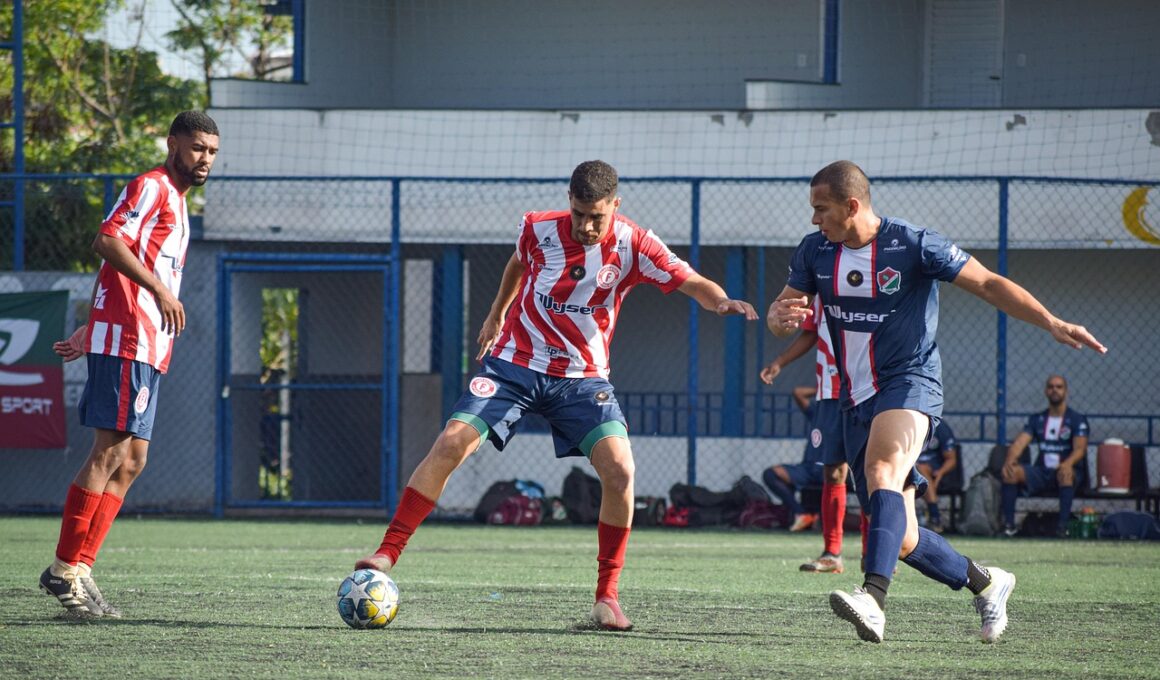Ethical Responsibilities of Coaches and Managers in Preventing Match Fixing
Sports ethics are vital in ensuring integrity within competitions, particularly in team sports. Coaches and managers play critical roles in upholding fair play and creating environments that discourage malpractices such as match fixing. Their responsibilities extend beyond mere strategic training; they must actively cultivate an ethical culture within their teams. This culture includes educating athletes on integrity, the seriousness of corruption, and the impact it can have on their careers and the sport as a whole. It is essential for coaches and managers to recognize signs of potential corruption, such as unusual betting patterns or athlete behavior changes. They should foster an open dialogue with players about the pressures they face, which could tempt them into match fixing. This proactive stance helps identify vulnerabilities before they lead to ethical breaches. Further, ensuring transparency in decision-making processes reinforces trust. Regular training sessions focusing on ethics can keep these issues at the forefront. Ultimately, by instilling a strong moral foundation in their athletes, coaches and managers can work diligently to prevent match fixing and uphold the game’s integrity.
Match fixing remains a significant concern in competitive sports, threatening the foundation of fair play. Coaches and managers must not only be aware of their ethical responsibilities but also actively engage in practices that promote clean competition. They should implement rigorous internal policies that outline the consequences of fixing and corruption. Furthermore, by collaborating with sports governing bodies, they can contribute to ongoing efforts aimed at reducing corruption in sports. These collaborations often result in improved education programs designed for players, encompassing integrity and ethical decision-making. Coaches and managers play a pivotal role in identifying and reporting any suspicious activities within their teams. It’s crucial for them to build strong relationships with their athletes, ensuring that players feel empowered to speak up against any unethical behavior they witness. Additionally, leveraging technology can aid in monitoring athlete behavior and betting activities, thus strengthening prevention efforts. The commitment of coaches and managers to uphold standards of integrity is non-negotiable. By prioritizing ethical practices, they can significantly diminish the risk of corruption in sports, fostering a culture that values honesty and fairness in competition.
Educating Athletes on Integrity
The education of athletes on the importance of integrity is essential for prevention of match fixing. Coaches and managers should employ various methods to instill a deep understanding of ethical behavior in sports. Organizing workshops and seminars featuring former athletes, ethics experts, and psychologists can help convey the significance of upright conduct. These sessions can address the mental and emotional pressures athletes face, highlighting how to resist temptation. Additionally, creating a mentorship program wherein seasoned players share their experiences can be enlightening. Coaches should also promote discussions on ethical dilemmas in sports, encouraging critical thinking among athletes regarding these issues. Developing codes of conduct that players commit to can further solidify their understanding of what behaviors are acceptable and those that are not. Furthermore, evaluating case studies of past match-fixing incidents and their consequences can serve as powerful lessons. By making ethical education a priority, coaches and managers can equip their athletes with the knowledge necessary to combat the allure of corruption effectively. This instills a sense of responsibility towards teammates, the sport, and fans who invest in the game.
Training and education are just parts of the solution to preventing match fixing. Coaches and managers must also continuously evaluate their own conduct, as they are role models for their athletes. Acting with integrity in every aspect of their professional lives sets a powerful example for the team. By maintaining transparency and fairness in their decision-making processes, managers between coaching staff and players, they reinforce their commitment to ethical behavior. Monitoring player performance and providing constructive feedback can often deter unethical practices. Additionally, they should emphasize the importance of strong team cohesion and trust, which discourages individuals from engaging in corrupt practices. While developing skills and strategies may be the focus of training sessions, the ethics component must remain prominent. Regularly revisiting these topics, especially during high-pressure situations, emphasizes their lasting importance. Furthermore, involving the whole organization in discussions related to ethics demonstrates that accountability does not rest solely on the coaching staff. This collective approach to maintaining sporting integrity enables teams to foster a culture of honesty, ultimately leading to a more engaging and trustworthy environment for both players and fans alike.
Creating a Supportive Environment
Creating a supportive environment is crucial in preventing match fixing and promoting fair play. Coaches and managers need to ensure that athletes feel safe discussing pressures they may face from external influences, such as betting syndicates. Establishing anonymous reporting channels can encourage players to report any suspicious offers they receive. This approach can help teams to identify threats of corruption early on. Furthermore, an environment that encourages open communication promotes a sense of collective responsibility among players, fostering a team ethic that prioritizes integrity. To achieve this, the leadership must consistently practice and promote values of trust and respect throughout the organization. Celebrating good ethical practices and reinforcing positive behavior through rewards can motivate players to stay true to their integrity commitments. Furthermore, engaging in community outreach programs strengthens the connection between athletes and the sporting community, reinforcing the relevance of fair play. A supportive environment also means addressing mental health and well-being, as stress and performance pressure can sometimes lead athletes to consider unethical options. By prioritizing a holistic approach to athlete welfare, coaches create a sustainable foundation for ethical behavior within their teams.
The call for accountability in sports has intensified, and coaches and managers are expected to take proactive steps in preventing corruption. Establishing a zero-tolerance policy towards match fixing should be a fundamental component of a team’s culture. This policy should be communicated clearly to everyone, ensuring that all team members understand the ramifications of any unethical behavior. Regular audits and discussions about ethical practices within the team can also help maintain this standard. Engaging with governing bodies and advocacy groups that focus on clean sports can provide additional support and resources in combating match fixing. Likewise, coaches should seek to involve athletes in these discussions, empowering them to take ownership of their advocacy against corruption. By fostering a sense of agency among players, they recognize the importance of their roles in maintaining the sport’s integrity. Communication remains critical; therefore, coaches must encourage a culture where athletes can voice concerns without fear of backlash. Together, these measures create a robust framework for accountability that benefits not only the teams but the entire sporting community.
The Role of Technology
Technology increasingly plays a role in preventing match fixing by providing tools for monitoring and transparency. Coaches and managers can leverage data analytics to identify unusual patterns or behaviors that may indicate corruption. Implementing tracking systems on player performance and betting activities can bring to light discrepancies that need further investigation. By utilizing technology, organizations can establish clearer oversight and ensure that ethical standards are consistently upheld. Furthermore, social media platforms can be used to educate the public and fans about the consequences of match fixing, raising awareness around the topic. Coaches can encourage athletes to engage with their supporters online, fostering a dialogue about integrity and the importance of clean sports. Collaborative efforts between governing bodies and tech companies can lead to more effective solutions, such as apps for reporting unethical conduct. The blend of technology, education, and a commitment to integrity creates an environment where match fixing is less likely to occur. Coaches and managers must remain open to adopting new technologies that can support their ongoing mission to promote fair play and transparency in their teams, ensuring sports remain reputable.
To conclude, the ethical responsibilities of coaches and managers in preventing match fixing are profound and multi-faceted. Through education, open communication, and the creation of a supportive environment, they play a critical role in shaping athletes’ understanding of integrity. Their efforts to foster a culture of honesty not only protect the athletes but also uphold the dignity of the sport. Proactive measures, including accountability initiatives and the utilization of technology, further enhance their ability to combat corruption effectively. By prioritizing ethics in every aspect of their responsibilities, coaches and managers can ensure that the integrity of sports remains uncompromised. Each leader serves as a vital link in the chain that connects athletes with their communities and the broader sport. A united approach involving all stakeholders, including players, USA sports bodies, and fans is essential in addressing match-fixing concerns. As a result, with commitment to ethical practices and transparency, the future of sports can be free from corrupt practices, paving the way for a more enjoyable and trustworthy experience for everyone involved.


